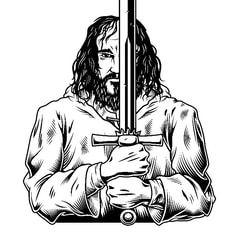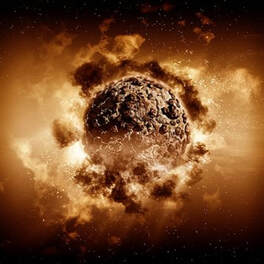|
https://www.freepik.com/free-ai-image/person-practicing-yoga-meditation-nature-sunset-sunrise_72401114.htm#fromView=search&page=1&position=2&uuid=ceb909ee-0afa-4ee0-a14d-b4cb4aed3ec2 Now thou must die in the silence, to the fleshly wisdom, knowledge,
reason, and understanding; so thou comest to feel that which brings thee to wait upon God; (thou must die from the other,) that brings thee to feel the power of an endless life, and come to possess it. (George Fox) I find George Fox’s words above to be personally relevant. Mine is a divided soul, half of which is rationalist and skeptical, half of which is mystical and believing. I don’t know that I would want my rational self to die, however. That way lies fanaticism, in which Biblical literalists declare that the world and universe are only 6,000 years old and that Jesus really walked on water and turned water into wine. Rather, I want my rational self to recognize that it is encompassed by a spiritual dimension which transcends scientific skepticism. Then, there is Fox’s comment about feeling “the power of an endless life.” Fox is no doubt thinking of the soul’s survival after death, of its acceptance into The Eternal, which many of us call “God.” I hope Fox is right. I hope, after dying, to find my personality still alive, freely interacting with God and all humankind. But I recognize, or rather my scientific/rationalist side recognizes, that death may bring oblivion with no personal consciousness of anything. And yet—metaphorically—Fox’s thought is still true. When we live, we are part of all life, of our friends and family, of the billions of strangers in the world, and of the natural world that we call the Universe. When we die, that world—that Universe—in all its mystery and beauty continues. That life is endless. That life is eternal. ~ Richard Russell
1 Comment
Image by dgim-studio on Freepik https://www.freepik.com/free-vector/fantasy-warrior-with-sword_8224235.htm#fromView=search&page=1&position=2&uuid=dbe175ce-af86-4a51-b0a7-97ec39487333 Jesus is known as the Prince of Peace who will rule over a peaceable kingdom. Yet he said, “Do not suppose that I have come to bring peace, but a sword.” (Matthew 10:34, NIV)
So, I guess Jesus wants a peaceable Kingdom of God; but he recognizes that there will be conflict in establishing that Kingdom. Yvette Shock writes this about Jesus’ double nature: Jesus’ last week in Jerusalem is full of confrontation. He enters in a way that is purposefully conspicuous, his homespun parade a kind of counterprogramming to the imperial show of force in Pilate’s procession into town. The next day Jesus disrupts the buying and selling and money-changing in the temple and in the days following, religious leaders come at him repeatededly trying to discredit him and get him into trouble. But all of this confrontation begins with a sign of peace: Jesus rides into town on a borrowed donkey, recalling Zechariah’s promise of the humble king, riding not a war horse but a donkey; the king who would “command peace to the nations.” Jesus confronts and disrupts all of the domination systems that harm, corrupt, or diminish the wholeness of God’s good creation and all of its people…Jesus confronts and disrupts—with a sign of peace. (Yvette Schock in Sunday’s Coming of The Christian Century, 3/18/2024) https://mailchi.mp/christiancentury/scfree_2024-03-18?e=3188fe17a7 ~ submitted by Richard Russell Photo by Richard Russell A tu lado mareado
Abrumado por tus ojos El roce de tus manos Me deja paralizado. El cuerpo está en la tierra, Con corazón acelerado, Pero el alma está volando Liberado por tus encantos. At your side I’m dizzy, Overwhelmed by your eyes. The touch of your hands Leaves me paralyzed. My body’s on the Earth, My heart beating fast, But my soul’s flying away, Freed by your charms. ~ Richard Russell How can I name a poem about romantic love, “A Quaker Poem.” Well, love is love in all its forms, and Quakerism—as I understand it—is about love. In the love of a man for a woman, as in this poem, we see a reflection of the love of God for human beings. Jesus told us to “love God,” but how can human beings truly love the hidden power that animates the Universe? We must instead love our neighbor; and in loving our neighbor, we love God. So, I could have titled the poem something like, “I Love My God through Thee” or “Fly Away, my Soul.” ~ Richard Russell Foreign visitors to the United States are often surprised by the religiosity of Americans. A 2023 Gallup Poll found that 82% of Americans identify as religious, spiritual, or religious and spiritual. According to a 2021 poll by the Pew Research Center, 63% of Americans identify as Christians and must (I assume) have some opinion about Jesus, Christianity’s central figure.
In fact, we are fascinated by Jesus—a fascination that is easily seen in the popular culture. For example, Mel Gibson’s film, The Passion of the Christ, a graphic and violent depiction of Jesus’ last hours, made the front page of hundreds of newspapers and was turned into prime-time specials on several television networks. The Da Vinci Code, a best-selling novel by Dan Brown, touted the idea that Jesus and Mary Magdalene were lovers. It spawned television shows and a film that titillated the American public. Then there is the Left Behind series of novels which describe Jesus’ Second Coming and the horrors of the Apocalypse. By 2004 the series had sold some 65 million copies and had even been turned into a video game! Among the 210 million American Christians, there are—naturally—different views of Jesus, Christianity’s central figure. Marcus Borg, in his book Jesus: The Life, Teachings, and Relevance of a Religious Revolutionary, describes four ways that Americans have come to understand Jesus. Perhaps the majority of American Christians see Jesus as the dying savior. Jesus has “died for our sins.” All human beings are sinful. God is a God of justice and must punish those sins. BUT God is also a God of mercy and wants to pardon sin. BUT someone must pay a price for the forgiveness of sins! Since Jesus is sinless, God can accept him alone as sacrifice and atonement for the sin of the world. And, so, God allows Jesus to be cruelly executed on a Roman cross. All who believe in this act of sacrifice, who believe in Jesus as God’s sin offering, will be saved from death—or, at least, their souls will be saved. Another common American take on Jesus, in effect, removes him from the human race. Jesus appears to be human, but he is really God. So it is that Jesus can walk on water, turn water into wine, and feed 5,000 people with five loaves and two fish. This Jesus can heal the sick, bring the dead back to life, walk through walls, and ascend into Heaven unaided by jet or rocket engines. He is also usually a sacrifice for sin as described above, but his main characteristic is his divinity. Adherents of the Jesus-as-God idea don’t always see the logical consequences of their thinking. If Jesus is God, he didn’t really suffer on the cross (God can’t suffer), and he can’t be a model for us humans to follow because we can never be divine and do what only a god can do. A third type of American Jesus is the apocalyptic Jesus. Believers in this Jesus may also see him as God and savior, but they concentrate on the end times when true Christians will be taken up to Heaven in the so-called “rapture.” These Christians will escape the seven years of “tribulation” that those left on Earth must endure. The sufferings of those left on Earth are imagined in the wildly popular “left behind” book series that culminates with Jesus’ Second Coming and a Last Judgment in which the majority of humankind is condemned to eternal torment. And where did this scenario come from? Well, of course, from a misinterpretation of the Book of Revelation in the Bible. A fourth type of Jesus is the Teacher of moral wisdom. The Americans who adopt this model are usually unsure about Jesus the savior, the healer, or the miracle-worker. But anyone can believe in moral precepts like “Do unto others as you would have them do unto you” or “Love your neighbor as yourself.” There is certainly nothing wrong with this image of Jesus; but, as Marcus Borg observes, it is a shallow understanding of a man whose wisdom was grounded in a deep spiritual life. And what kind of Jesus do I, a Christian Quaker, believe in? I accept Jesus as teacher but I also see him as prophet. I believe Jesus was inspired by Spirit to preach, not only the Golden Rule, but also the Kingdom of God—what Martin Luther King would call the “Beloved Community.” This Kingdom of God is present now, in this life, in this present reality. While we are still alive, we can enter this Kingdom, in which morality is superseded by obedience to God—not that God would have us commit immoral acts, but our spiritual life transcends a simple morality. Or so I believe. ~ Richard Russell I was in a conversation recently about the zeitgeist of our current time with a group of friends and was reminded of the film The Golden Compass. In that film Lyra, the main character, has an alethiometer, a compass-like artifact that reveals the truth.
What a wonderful invention!! In our time where truth seems to have become fungible, one alternate fact easily replacing an actual fact, we are living in one world but "sharing" different realities. What is the word for that? Schizophrenia? When I was growing up we did not "curate" our "self image" as teens. We were just kids being kids. Maybe when you went to write your college entrance exam you burnished up your image a bit, but it was not a full time job. It is as if there are two of us. Our real self and the one we "present" to the world. What I'm getting at is that there is a deep seated inauthenticity about the times we are living in. AI can generate fake video, fake photos, fake authorship and even deep fake voice prints of people saying stuff they never uttered. But who are we? And who do we need to be for our time? Here's a few queries that have come to my mind that may help clarify those two questions: 1. What can a human being authentically generate? 2. What can a human being, as a spiritual being, bring into existence from that which is God within us? 3. What is real? And What is truth? And what is our own internal Aleithiometer? Not easy questions but worth asking. At the end of the Golden Compass Lyra destroys the thing that tears children from their souls. As an observer of both history and society, it seems that we are in the process of crumbling. Old forms are breaking down so new forms can take their place. The essential element at the center of all of this is discernment. That good old Quaker value that has us pause and listen for wisdom. That might just be our Golden Compass. ~ Joseph OLejak Image designed by freepik at https://www.freepik.com/ Useage information: https://support.freepik.com/s/article/How-can-I-use-free-images?language=en_US …is the greatest science-fiction novel ever written. The concept of the book is riveting, and its language rises to literary heights. What’s it about? Well, I won’t summarize the entire story; but at the end of the book the human children of the world become non-human entities that swarm across the Earth and destroy the planet. I’ll quote one character—Jan—an adult who remains on Earth and witnesses the apocalypse:
The buildings round me, the ground, the mountains—everything’s like glass—I can see through it. Earth’s dissolving…. The light! from beneath me—inside the Earth—shining upward, through the rocks, the ground, everything—growing brighter, brighter, blinding— The author concludes this description of a cosmic transformation: In a soundless concussion of light, Earth’s core gave up it’s hoarded energies. For a little while the gravitational waves crossed and re- crossed the solar system, disturbing ever so slightly the orbits of the planets…. There was nothing left of Earth: They (the non-human children) had leeched away the last atoms of its substance. It had nourished them, through the fierce moments of their inconceivable metamorphosis, as the food stored in a grain of wheat feeds the infant plant while it climbs towards the sun. (Childhood’s End, Copyright 1953, 1981,1990, 2001 by Arthur C. Clarke, electronic edition copyright 2012 by RosettaBooks, LLC) So, what does this science-fiction scenario have to do with Quakerism? Well, as a Christian Quaker, I believe that at death we return to God. But what does that mean? Does our soul dissolve in the Divine Substance, our individual memories and personality disappearing? That would be—I think—like the metamorphing children in Clarke’s story. Or do we preserve our individuality and continue to act in freedom although transformed by the Eternal Presence? For what it’s worth, the New Testament teaches the latter idea. In this dichotomy, I opt for the latter although I freely admit there’s no scientific evidence for the idea. Still, I can’t help quoting my favorite Bible verse, 1 Corinthians 13:12: “For now we see through a glass, darkly; but then face to face: now I know in part; but then shall I know even as also I am known.” (KJV) ~ Richard Russell Namely, Halley’s Comet, which returns to viewing distance from Earth every 76 to 79 years. When I saw the comet in 1986, it was not that spectacular; but by going to a dark-sky place called Enchanted Rock, I saw what looked like a star with a long line stretching away from it. The 1910 appearance, which my grandfather observed, was much more impressive, inspiring fear of being poisoned when the Earth passed through the comet’s tail.
Howard Thurman, the minister and civil rights leader, was fearful when he—as a young boy—looked at the 1910 comet; but young Thurman also had a mystical experience while viewing Halley’s: In that moment (of seeing the comet) something was touched and kindled in me, a quiet reassurance that has never quite deserted me. As I look back on it, what I sensed then was the fact that what stirred in me was one with what created and controlled the comet. It was this inarticulate awareness that silenced my fear and stilled my panic. https://www.plough.com/en/topics/faith/prayer/a-boy-and-a-comet So, what has all this to do with Quakers? Well, most Quakers believe in God/the Inner Light/Spiritual Power or at least a mystery at the heart of the universe. For many, if not most friends, Nature and natural phenomenon like the Comet evoke a mystical experience of that Spiritual Power, that Mystery. And Quakers believe in connectedness, the connectedness of Spirit with human beings and of human beings with one another. Halley’s Comet connects human beings across the generations. When I saw the comet in 1986, I thought of my beloved Grandfather. When the comet returns in 2061, my granddaughter Evie will—I hope—remember me. ~ Richard Russell |
This blog was set up to post content of interest to Old Chatham Quaker members and attenders. Posts related to one's own personal spiritual journey, reports based on interviews with others, and reflections on Quaker-related topics are welcome. Posts by individuals are personal expressions and do not necessarily reflect those of the Meeting as a whole.
Guidelines for posting on website blog:
Submit to member of Communications committee; committee has editorial oversight over all content posted on the Meeting website. Be respectful of the nature of vocal ministry given in Meeting for Worship or other settings and any private conversations about spiritual matters. Cite source of any image or other external content submitted. Archives
July 2024
Categories |






 RSS Feed
RSS Feed